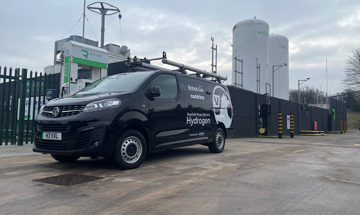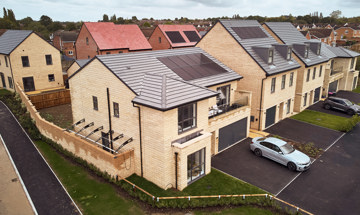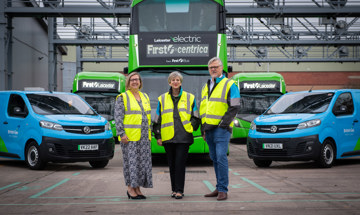Michael Pullan - Senior Communications Manager
T: 07557 619446
People without a driveway will be left behind in the race to electric vehicles in the UK
- New data reveals only 9,317 on-street chargers are planned for installation over the next 4 years.
- 83% of UK drivers agree that it’s easier for drivers with a driveway to switch to electric vehicles.
- Levelling up? Southern councils planning to install 2.5 times as many chargers than councils in Northern England, the Midlands, Wales, Scotland and Northern Ireland combined.
- Motorists are keen to switch to electric vehicles to meet the 2030 ban, as requests for on-street charging to councils rose by 43% between 2018 and 2019.
- Centrica working with Ford, Volkswagen and Vauxhall to install smart charging points on driveways.
New research released today reveals that councils are planning to install an average of only 35 on-street electric vehicle (EV) chargers, between now and 2025.
The research commissioned by Centrica under a Freedom of Information request to over 400 councils shows that there are 7,682 on-street chargers currently installed across the UK and only a further 9,317 are planned to be rolled out over the next 4 years. This leaves drivers without a driveway, those who have no access to home charging, a long way behind in the race to switch to EVs in time for the 2030 ban on petrol and diesel models.
Out of drivers who do not have a driveway or off-street parking, just 7% already have an EV, less than a quarter (24%) are considering switching but over half (53%) are not considering purchasing an EV at all. When all drivers were asked to consider the ban, a huge four out of five (83%) said that they think it will be easier for drivers with a driveway to make the switch.
The research also shows that installation plans are not distributed evenly across the UK. Southern English councils are set to install two and a half times as many on-street EV chargers by 2025 than councils in Northern England, the Midlands, Scotland, Wales and Northern Ireland combined, with 6,713 vs 2,604 respectively. The latest figures show that southern councils have also plugged in 1,203 more chargers into their streets over the last three years than their northern counterparts. More than 4 in 10 (41%) drivers agreed that there is a North/South divide in council funding for charge point installations.
A huge 126 councils across the UK have no concrete plans to install any more EV chargers than they already have between now and the end of 2025. These include Bridgend, Fermanagh & Omagh, Dumfries & Galloway, Havering and Warrington.
With less than 10,000 on-street chargers planned to be installed by 2025, it’s clear there is a gap between supply and demand with 2,835 requests for on-street charging made to councils in 2019, increasing 5% to 2,989 requests lodged to councils by September 2020.
Perhaps in response, The Transport Secretary announced in January 2020 that government funding will be doubled to £10 million for the installation of charge points on residential streets next year. This could fund up to 3,600 more charge points across the country and make charging at home and overnight easier for those without an off-street parking space.
Centrica recently shared the results of the UK’s largest trial of energy flexibility, which saw over 200 homes and businesses in Cornwall trading stored renewable electricity. Energy sharing via electric vehicles and battery storage is key as it provides storage capacity for times when energy supply outstrips demand and vice versa. This provides an opportunity for drivers to monetise the stored energy in their cars, a little talked about incentive for making the switch to an EV. In fact, over half (53%) of drivers said they didn’t even know about this benefit.
When asked about barriers to EV ownership, half (49%) of drivers who said they would not consider purchasing an EV blamed the lack of access to on-street or public charging points in their area. The cost of an EV itself is also a major concern amongst two thirds (61%) of those who are put off switching, alongside battery life (48%) and range anxiety (42%). More than three quarters (77%) of drivers said that investment into more on-street charging points in urban areas would encourage more drivers without a driveway to go electric, as did a further three quarters (76%) who also said that the same investment in rural areas would boost local EV adoption.
“The latest figures released today demonstrate the need for all UK councils to play their part in helping to achieve the 2030 ban. Whilst it’s great news that the government are providing initiatives to make the transition more affordable, cost isn’t the only barrier. With half of drivers attributing lack of chargers as the main reason preventing them from purchasing an EV, it’s unfair that those without a driveway risk getting left behind. Charging infrastructure and energy systems will need be upgraded to cope with the demand and support drivers. For example, we are working with businesses to install smart charging systems which help automate charging at times which does not put pressure on the grid. This helps regulate demand and ensures customers get the best deal on electricity prices. We are developing ways to support consumers, with and without driveways, in their transition to EV. For any customers who have been considering purchasing an electric vehicle but have concerns about costs and charging, our EV Top Tips offer some helpful advice to put your mind at rest and help you make the switch."
Amanda Stretton - Sustainable Transport Editor at Centrica

News
British Gas introduce hydrogen-powered van trials
Tech & Innovation

News
British Gas To Extend ‘You Pay: We Pay’ initiative
Tech & Innovation

News
British Gas Partners With Strata And Daikin To Launch Eco-Tech Low Bill Homes
Tech & Innovation

News
Centrica expands green power portfolio with purchase of Belgian Batteries
Tech & Innovation

News
Bord Gáis Energy acquires Leading Irish Solar PV Installer Swyft Energy
Tech & Innovation

News
First Bus and Centrica Announce New Electric Vehicle Charging Partnership
Tech & Innovation
